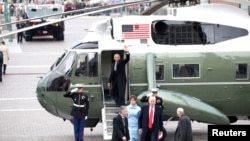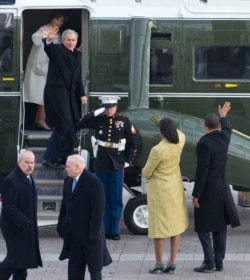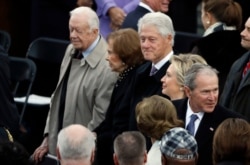Despite virulently opposing the results of the November presidential election won by former Vice President Joe Biden, President Donald Trump is planing to leave the White House the morning of January 20.
He will follow in the footsteps of every single one of his predecessors. No president in American history has refused to exit the executive mansion.
But what would happen if one did?
“The principal goal in designing our system was that we not have a monarch with indefinite tenure. The president has a four-year term and if he gets re-elected, great, but if he doesn't, then he goes away,” says Brian Kalt, a professor of law at Michigan State University’s College of Law.
The Constitution, the supreme law of the United States, states that the president, “shall hold his Office during the Term of four Years.”
“And the 20th amendment declares that his term ends at noon on January 20 and the new president takes the oath and becomes president at noon on January 20,” Kalt says. “At noon, this person is not the president anymore ... he's a trespasser at that point.”
What would happen if a president refused to leave the White House?
“After the new president was inaugurated, he would call on the Secret Service or the military to escort the old president out of the White House,” says historian Bruce Kuklick. “And it would happen.”
Besides, occupying the White House does not make a person the president.
“What makes you president is being inaugurated president of the United States as a result of a process of deciding who won the election,” says Kate Masur, an associate professor of history at Northwestern University. “There's nothing in the Constitution that says you have to be literally in the White House.”
Officials throughout the government are crucial to the peaceful transfer of power. Many federal workers, including those in the military, Secret Service and FBI, take an oath to defend the Constitution, which means recognizing the winner of the Electoral College vote.
“The Constitution outlines that there is an Electoral College, and it gives an outline of how a new president is chosen,” Masur says. “And if you refuse to cooperate with the procedures established under that part of the Constitution that lays the framework for how a president is chosen, you are violating your oath of office.”
Historian Kuklick says the weight of political culture and public opinion, rather than specific words in the Constitution, are what prevent American presidents from overstaying their welcome.
“The guy couldn't get away with it and it's not a matter of what's written in the Constitution,” he says. “It's about the conventions of government and the traditions. I mean, there just wouldn't be any support for his doing that.”
Kuklick says democratic traditions like free and fair elections and the peaceful transfer of power are integral to how Americans see themselves. And these dearly held conventions are not something they’d let go of lightly.
“If you're a U.S. national, from the time you've gone to kindergarten, you’ve heard the stories about how the United States operates and the kind of constitutional democracy it is. And in your own lifetime, you've seen presidents lose and go out of power,” says Kuklick. “It's just part of the pageantry and majesty of this constitutional regime … It's born and bred into them.”






